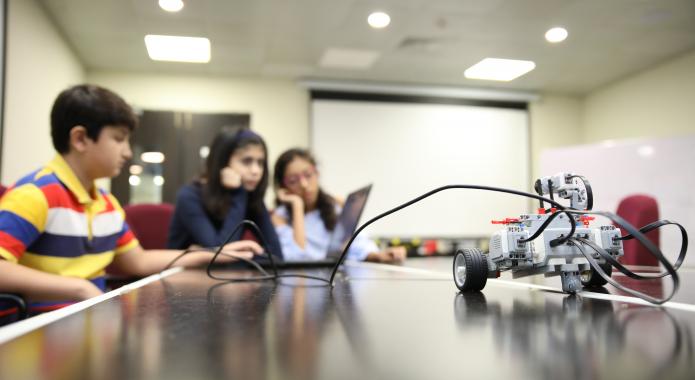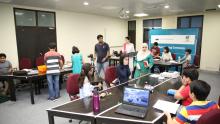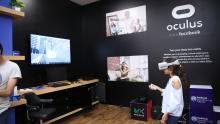
MPhil Education Leadership and Management (ELM) students at the Syed Ahsan Ali and Syed Maratib Ali School of Education (SOE), Habiba Malik, Injila Rasul, and Ummara Waheed, conducted a Robotics Camp in collaboration with faculty from SOE and the Syed Babar Ali School of Science and Engineering. Two camps were held at SOE, consisting of 12 students each between the ages of 11 and 13 years old, where they cultivated their robotics and computational thinking skills.
The MPhil students had observed through visits to some high cost private schools and through meetings with the curriculum designers that ‘Robotics’ is being used as an umbrella term to teach either engineering concepts, design thinking skills or construction of robotic kits. According to them, they found these observations problematic as there was no set framework or pedagogical approach outlined that was guiding the development and design of these robotics curricula, rather an ad-hoc approach was being used that was seldom contextualised. Another issue that they came across was teacher training, which was being done without necessary tools, resources and content knowledge. They also realised that the learning outcomes are either undefined or not linked with the concepts being introduced.
To understand these issues in greater depth and outline the elements of design that are essential to a robotics education, these MPhil students designed a summer camp for defining, cultivating and assessing these skills and to introduce a directed and research-backed approach towards robotics education. Using LEGO-Mindstorm EV3 kits, they introduced problem scenarios that existed within the Pakistani context and tasked the students with building line-following robots with obstacle avoidance features. In the second batch of the camp, they used reflection essays at the end of each day.
The team engaged deeply with the students and tailored their content and method in response to the unique skillset and personality each child brought into the camp. It allowed for them to be self-reflective, adaptive and therefore, efficient. They incorporated activities such as visits to Oculus, the Facebook-run Virtual Reality Lab at the Syed Babar Ali School of Science and Engineering, where the students used the VR system to do exciting activities such as city exploration and skiing in Virtual Reality. They also visited the sports complex to play group games of table tennis, basketball and blindfolded maze. While sharing her experience on conducting the workshop, Injila said, “The most fascinating thing about the experience was how the design, pedagogy and methodology evolved to cater to the needs of our students, underlining for me, the dynamic nature of all educational institutes and programmes.”
The design of the camp allowed for students to create solutions for problems that existed around them, with the pedagogical approach of gradual introduction of concepts, allowing time and space to build familiarity and understanding of the different parts of the robot they were working with. Their use of these concepts and practices were assessed through observations by the research team and a reflective instrument at the end. Ummara, while explaining the significance of the camp, said, “Robotech enabled us to appreciate the affordance of robotics and closely observe the team dynamics when our students embarked on solving a tough challenge.”
These workshops are imperative in cultivating creative, critical and independent thinkers - a skill set that is crucial to develop in our student population within the socioeconomic and educational context of Pakistan. The workshop not only proved to be beneficial for the students, but also provided valuable experience to the MPhil students who conducted it. Habiba, who conducted the camp along with Injila and Ummara said, “Running this camp has helped me enhance my grasp on robotics teaching, improve my management skills and develop the instruments that capture the focal elements of my research.”










